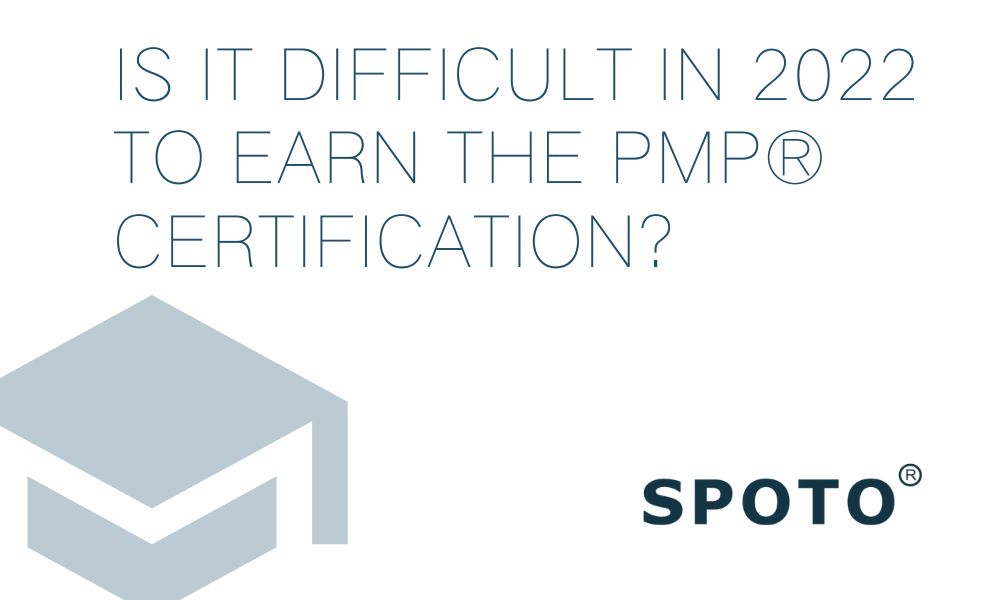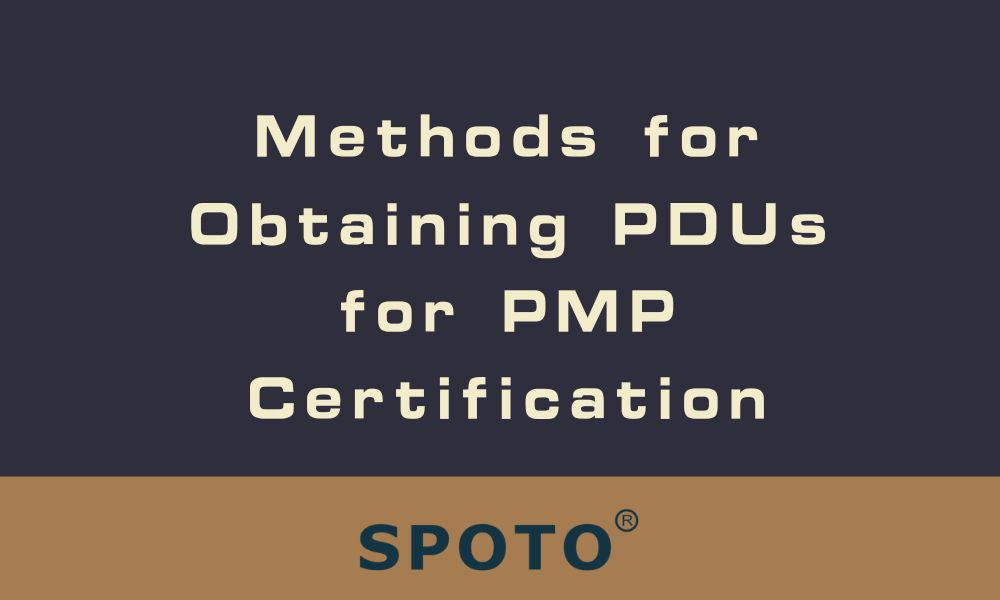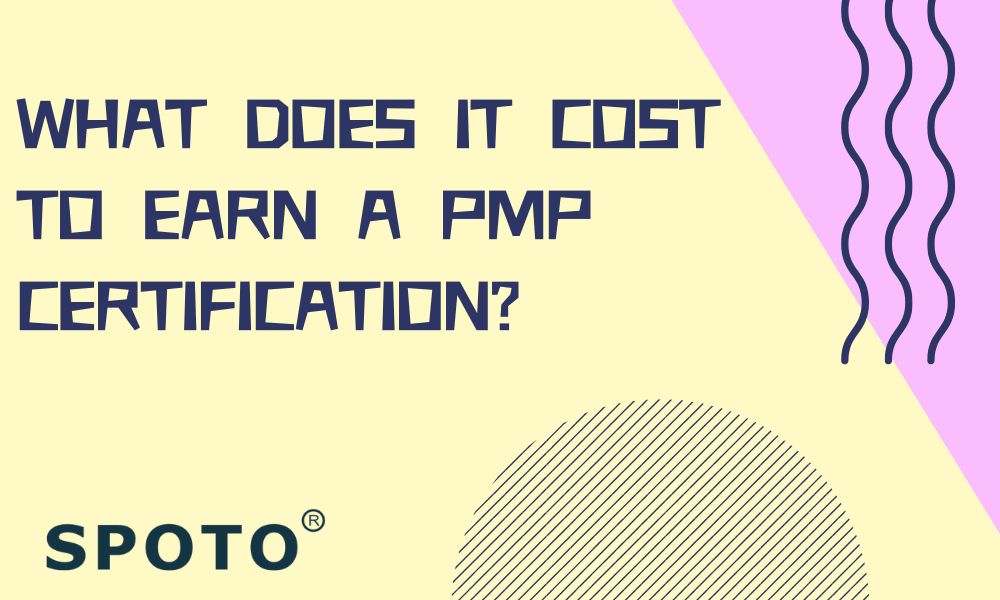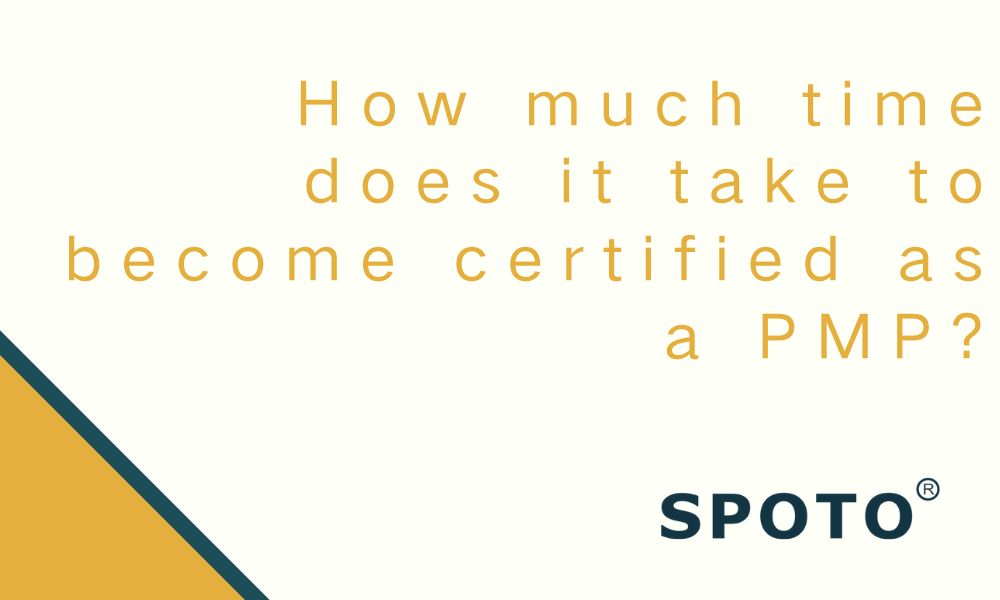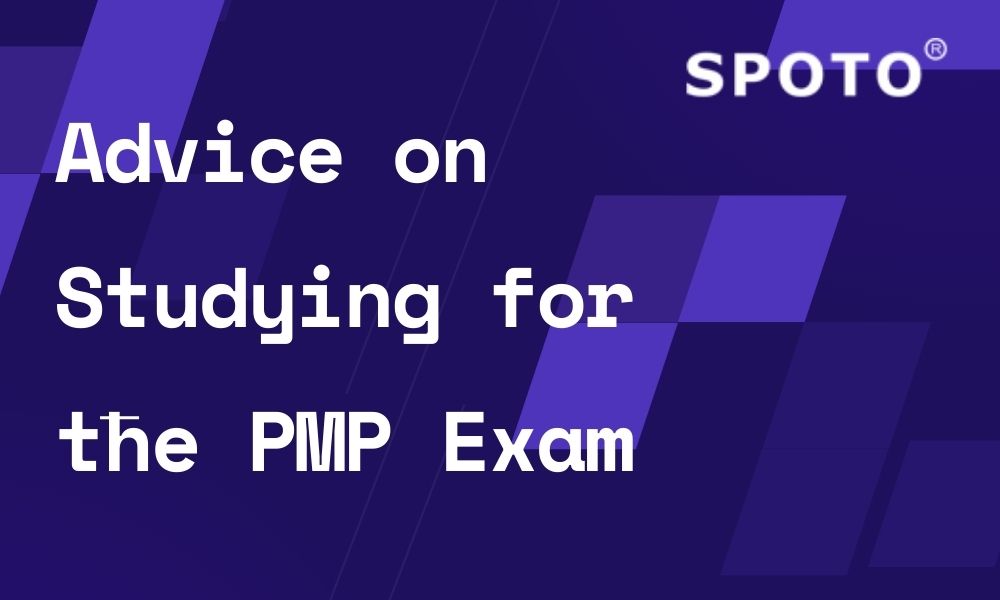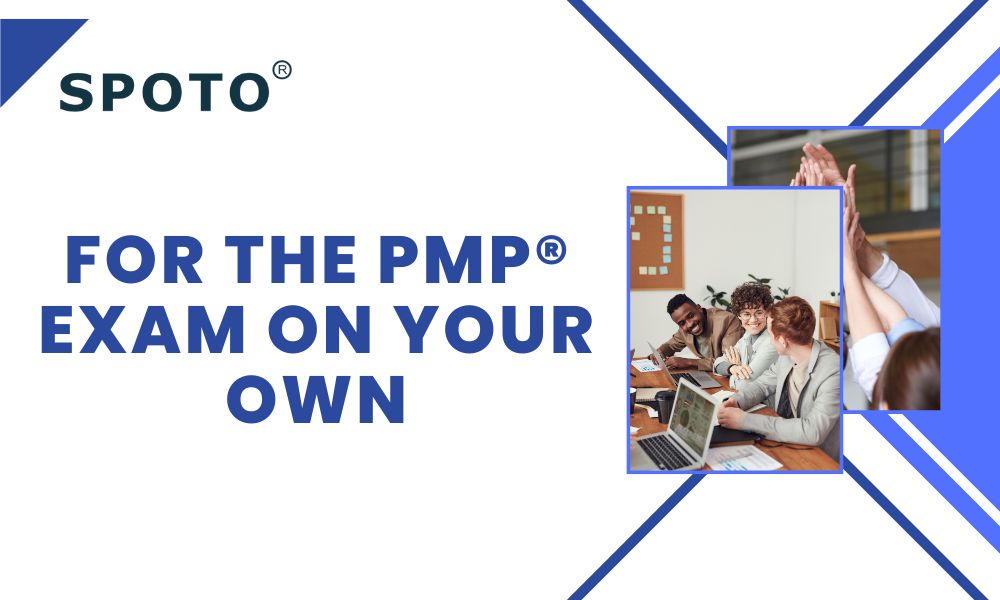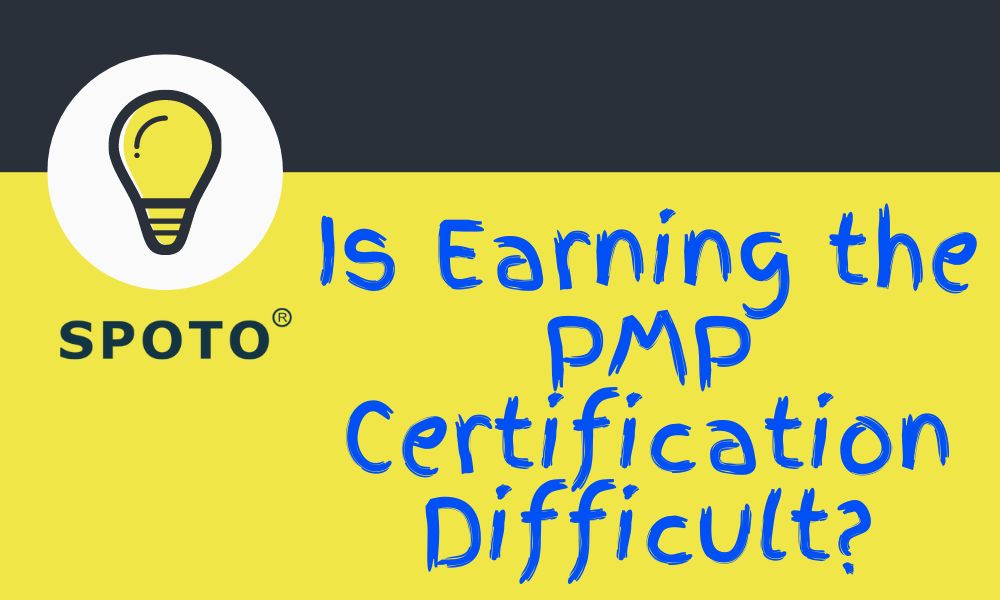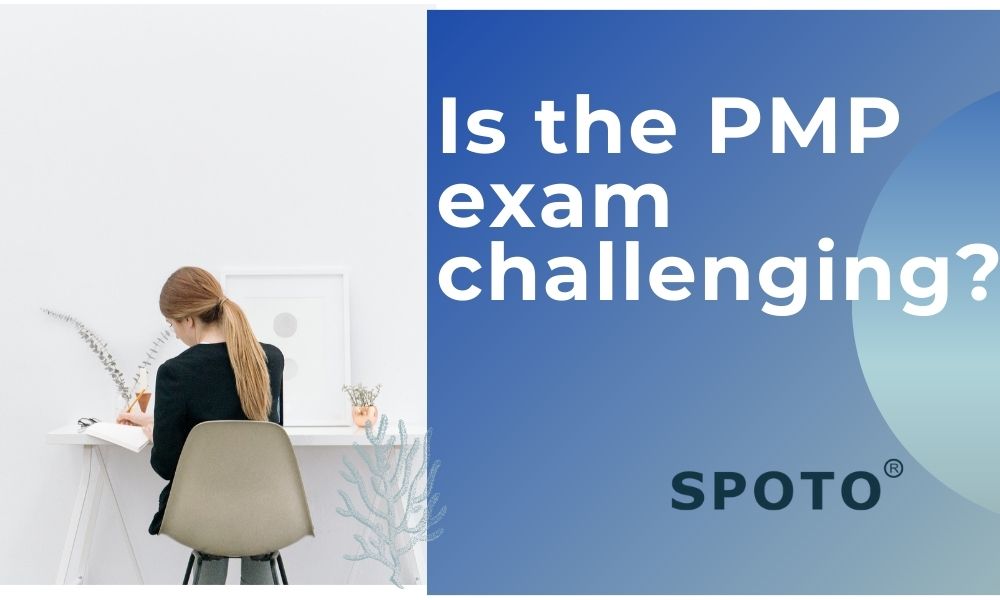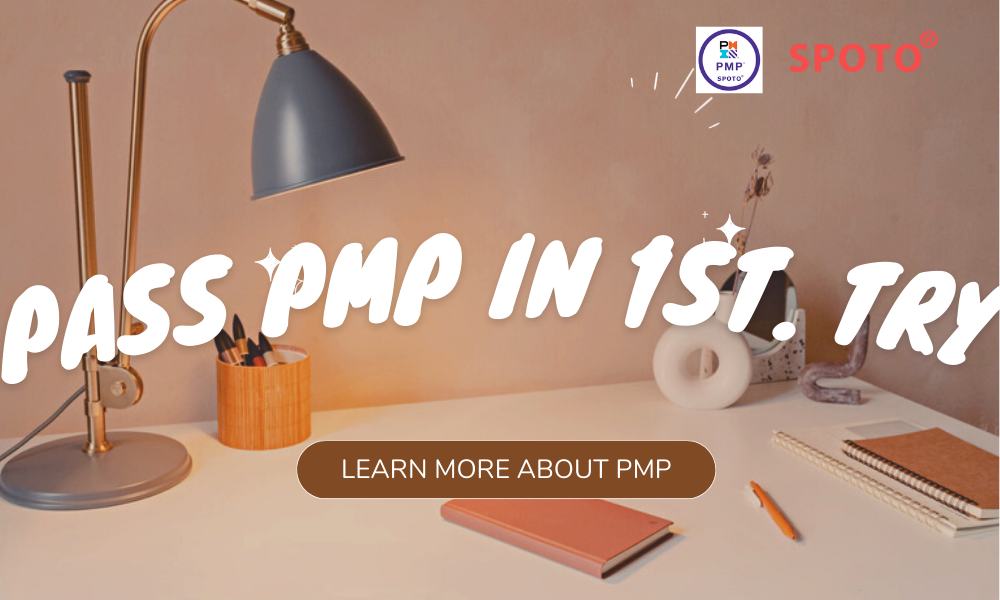TRUSTED BY THE SMARTEST TEAMS IN THE WORLD FOR CERTIFIED CANDIDATES
SPOTO Blogs
Useful learning materials to become certified IT personnel
-
- 917
- SPOTO
- 2022-08-29 22:41
-
- 792
- SPOTO
- 2022-08-24 23:40
-
- 820
- SPOTO
- 2022-08-15 21:33
-
- 1096
- SPOTO
- 2022-08-10 20:30
-
- 806
- SPOTO
- 2022-07-27 21:23
-
- 659
- SPOTO
- 2022-07-22 21:14
-
- 860
- SPOTO
- 2022-07-11 23:46
-
- 896
- SPOTO
- 2022-07-06 16:58
-
- 1041
- SPOTO
- 2022-07-01 16:31
TRUSTED BY THE SMARTEST TEAMS IN THE WORLD FOR CERTIFIED CANDIDATES
SPOTO Blogs
Useful learning materials to become certified IT personnel
-
- 917
- SPOTO
- 2022-08-29 22:41
Is It Difficult in 2026 to Earn the PMP® Certification? One of the first qualifications most firms look for in potential project management applicants is the Project Management Professional (PMP)® certification. Then, how difficult is it to obtain your PMP certification? To earn the PMP certification, you must meet specified Project Management Institute (PMI) requirements and successfully complete a demanding certification exam. Though challenging, obtaining the PMP certification is not impossible. By reading this guide, you can learn more about the exam's challenges and how to acquire this project management certification. Is earning the PMP Certification challenging? PMI has developed a complicated PMP certification procedure. In addition to having to fulfill several requirements to be considered for the exam, the PMP exam is designed to gauge your knowledge and competence in every aspect of project management. Is the failure rate known? The PMP exam is famous for being challenging. But PMI withholds specific information about the passing score or failure rate. According to particular studies of project experts, who estimate the failure rate to be between 40 and 50 percent, only around half of first-time test takers pass the PMP exam. The failure rate for the PMP exam is not, however, made public. Although some sources could mention a failure rate or a PMP score that qualifies, these are only estimates, and the majority of the time they are inaccurate. There definitely isn't a strict ratio of correct to incorrect answers to determine whether you pass or fail the exam because it is scored using psychometric analysis. A PMI-approved testing facility will grade your exam and rate your knowledge, skills, and aptitude while taking into account the difficulty of each question. Imagine answering all of your simple questions accurately but all of your complex questions poorly. In that instance, the difficulty of your questions will be taken into account when calculating your score, and you will probably fail the PMP exam. Your scoring will differ from any other candidate's because each PMP certification exam has a separate set of questions. While another applicant might successfully answer 70% of their queries and fail, you might successfully answer 65% of your questions and pass. Visit our website on what to aim for in PMP exam practice tests for more details on the predicted failure rate and a passing score for the PMP exam. The PMP Certification exam is how challenging? The PMP exam is extensive and difficult. It evaluates your ability to absorb and apply your information as you would in actual project management situations and contains a substantial quantity of material. You cannot expect to pass the PMP exam by only studying the terms, ideas, and formulas. One of the challenges of the PMP exam is the breadth of knowledge you must be able to comprehend. You should be knowledgeable about the best practices that are regularly used in managing current projects. Your knowledge base should include: 1. People, Process, and Business Environment are the three domains of the PMP Exam Content Outline (ECO) 2.35 many duties connected to these domains 3. Different competencies are necessary for qualified project managers in all businesses. 4. The techniques to project management that are predictive (also known as waterfall), Agile, and Hybrid 5. Useful mathematical concepts and formulas for the PMP Complex Questions The PMP exam questions are challenging because they examine your knowledge and abilities, not just your memorization. You will be given likely project management problems to solve by applying the techniques, tenets, and tools from the PMBOK Guide and other authorized sources. There may be more than one possible accurate response to each question, according to the "optimal" solution. If you discover the correct response, you shouldn't just check it and continue. You must choose the answer that is "most" appropriate for the scenario at hand, whether that response is correct because it is the most logical, the first thing you should do, or for any other reason. Studying each question attentively is essential because the PMP exam's questions could be somewhat lengthy. As the exam goes on, this could get much more challenging because you have to maintain your patience and concentrate for over four hours straight. Additionally, you might need to sort through irrelevant data to determine what is and isn't essential for the answer. Following are some suggestions to help with these challenging questions: 1. Read the final sentence to help you focus on the most critical information. 2. Study proportional formulas. Although the new PMP exam may not contain nearly as much math as previous versions, you should be familiar with all the procedures to swiftly and correctly interpret any arithmetic questions. 3. Highlight any study material that you find especially difficult. You could fail the PMP exam if you perform well in all areas but exceptionally poorly in one. Instead, make the extra effort to comprehend the most challenging places. How to enhance the likelihood that you will pass the PMP exam Despite the fact that the PMP exam is difficult, PMI is not seeking to mislead you or prevent you from becoming certified as a PMP. This assignment is meant to make sure you thoroughly understand the principles of project management. The PMP exam is a difficult certification examination that needs a great deal of dedication, motivation, and self-control both before and during the trial. Utilize these study strategies to get ready for the PMP test and obtain this in-demand credential. Despite how challenging it is, if you use these study strategies, you stand a good chance of passing the test. SPOTO was one of the first businesses to provide online PMP certification training. If you want to develop your career, start preparing for the PMP Certification Online Courses and Exam Simulators offered by SPOTO. You will be prepared for the certification tests with the help of these courses and practice questions, and they will enable you to ace the test the first time. -
- 792
- SPOTO
- 2022-08-24 23:40
Methods for Obtaining PDUs for PMP Certification Are you a certified project manager after passing the PMP® exam? You might now be asking how to keep your certification current. This post will define PDUs and show how to obtain them without overspending on certification renewal. What do PDUs do? What does PDU stand for? Your PDUs (Professional Development Units) demonstrate your continuous professional development. You gain PDUs along your voyage. PMI encourages you to apply, use, and expand project management concepts to improve your skills. There are numerous ways to improve your abilities. PMI created different PDU categories once they recognized the methods. Additionally, as part of the Continuing Certification Requirements for keeping your PMI credential, PMI specified these areas. You can maintain the active status of your PMI credential by obtaining and reporting 60 PMP® PDUs throughout a three-year cycle. When should I begin accumulating PDUs? As soon as you receive your PMP® credential, you can begin. Start utilizing the various options for your professional development today for more information on the different, straightforward ways to earn PDUs. The link "https://cciedump.spoto.net/" will take you to a page where you may read more about the information you require. Project Management Professional (PMP)® certified professionals must renew their credentials every three years. Professionals seeking PMP® certification must have acquired sixty PDUs within these three years. 3 Strategies for Earning 60 PDUS on a Limited Budget You can obtain 60 PDUs in several methods without spending much money. Watching webinars is one. With your PMI® membership, you can watch videos to earn PDUs. You can earn 1 PDU by watching an hour of tape or a webinar. Therefore, you can view 60 videos or webinars on any topic to earn 60 PDUs, provided time is not an issue. 2. Manage projects for a living. You can obtain up to 25% of the necessary PDUs by working as a project manager. You can submit 5 PDUs a year if you do project management for at least six months out of the year. So, by just managing projects, you can earn up to 15 PDUs at the end of your recertification cycle. 3. Adding new knowledge. There are various ways to earn PDUs in this category, including writing or co-writing articles, books, or newsletters, hosting webinars or podcasts, giving speeches, or teaching courses. One PDU may be earned for every hour spent on preparation or delivery. Up to 45 PDUs are allowed for this category. On a tight budget, earning 60 PDUs is not inconceivable. To reach the requisite 60 PDUs, you might have to put a lot of time and effort into it. The most accessible approach to getting 60 PDUs is to enroll in an online course that allows for self-paced learning. You will only need to invest some effort and self-control to use these methods. You can learn at your own pace whenever and wherever you choose with many audio or video-based courses. Following these courses, you can immediately claim PDUs without additional fees. This is much more cost-effective than alternative ways while saving time and energy. Advice on obtaining PDUs To earn PDUs for a PMP certification renewal, heed the advice below: Obtain several PDUs at once. To maximize the number of PDUs, you can get, try to obtain many PDUs at once. As long as you're not earning more than the maximum allowed for a category, there's usually no restriction on how many you can make at once. For instance, if you volunteer at a project management event, both your service time and your attendance at the event will count toward your PDU total. Consider the things you've done in the past. If your three-year deadline is drawing near, take some time to consider any prior qualifying actions you may have taken, such as participating in a debate or presenting a project. You can discover that you have extra units you didn't log because there are many ways to acquire PDUs. For the activity to count toward your total, try to give evidence. Maintain a log of your project management activities. Keep track of your actions in a journal or spreadsheet as you earn PDUs. Include the activity's description, duration, time, and the occasion's date. For instance, you may record how much time you spent reading or researching. You can use this to claim your PDUs. The link "https://cciedump.spoto.net/" will take you to a page where you may read more about the information you require. -
- 820
- SPOTO
- 2022-08-15 21:33
What does it cost to earn a PMP certification? Do you have any upcoming plans to sit for the PMP® certification exam? You should move on to the next phase by beginning the application procedure. But first, you must clearly understand the fees associated with earning your PMP® certification. One of the most valuable and in-demand qualifications in project management is the PMP®. With a PMP® certification, you'll have access to more opportunities and high wages. However, the PMP® exam is more complex than those for other certifications and passing it calls for more study. There are numerous factors to consider when attempting to determine the price associated with the PMP® certification process. The PMP certification fee covers the application and exam fees and any additional expenses related to exam preparation. You must pay $555 as the exam price to take the PMP® certification test. By joining PMI, however, you can reduce it to $405. But there are other costs associated with PMP® certification as well. The following details help to clarify the costs further: 1. Sign up as a PMI member You are not required to join PMI to take the PMP® certification exam. However, joining PMI has advantages that go beyond the cost of membership. The total cost of the first-time registration charge and the annual membership fee is $139. By joining PMI, you can get the exam for $150 less. In addition to the exam price, you also receive a free copy of the most recent PMBOK® Guide edition and additional standards or guidelines produced by PMI, which you must thoroughly understand to pass the PMP® exam. Additionally, you can earn the mandatory PMP® PDUs for free by participating in the yearly online conferences and watching webinars that are only accessible to members. 2. Exam fee for PMP® certification You must pay $405 for the PMP® certification exam once you join PMI to sit for the computer-based test at your local Prometric testing facility. But the cost for non-members is $555. The PMP® certification exam may be taken three times within the one-year eligibility term. Again, if you are a member of PMI, the PMP® re-examination price is only $275, as opposed to $375 for non-members. 3.PMBOK® Guide You shouldn't think of the PMBOK® Guide alone as the PMP® exam syllabus if you want to pass. It serves as the official PMP® exam reference guide. Every aspirant should study the PMBOK® Guide several times as they prepare for the PMP® exam. The actual PMP® test contains questions from the PMBOK® Guide. The PMBOK® Guide is now available for $47.98. become a member of PMI. The PMBOK® Guide is then available for free download on the PMI website. 4.Attending the project management training course and receiving 35 contact hours To take the PMP® test, you must finish 35 hours of project management coursework. To obtain these 35 contact hours, enroll in a project management training course. Depending on the training provider, the price of these courses varies. To achieve this requirement, you must spend about $1,000. 5. PMP® test study guides As you are aware, the PMP® certification test has a complicated exam format. Therefore you must be well-prepared to pass it in one sitting. Reference books are available both offline and online. You can use these tools to learn about project management as you prepare for the PMP® exam. 6. Updating your identification Once you've earned your PMP® certification, your search is unstoppable. Your PMP® certificate has a three-year expiration date. Therefore, you must renew your credentials to keep your credentials current. Therefore, every three years, you must pay $150 to renew your certificates. However, you can reduce this expense by joining PMI to $60. The most effective way to get PMP® certified There are three ways you can receive training for the PMP® certification. They are instructor-led training, self-learning methods, and classroom instruction. Although each of the modalities mentioned above has advantages and disadvantages, self-learning is considered the most affordable of the three options. When looking for the best online training program for your PMP® certification, you should take into account the following significant factors: 1. Is the trainer a recognized training organization? 2. Will you receive a certificate for the 35 hours? 3. Is the instruction given in English? 4. How long does the eLearning access last? Courses to Consider The actual module examinations and instructional videos are available through SPOTO. You now have the opportunity to succeed in this exam on your first attempt. Be sure to go on to SPOTO and obtain the appropriate assistance as and when needed if you want to learn more about the PMP training sessions and get a deal on the dumps. -
- 1096
- SPOTO
- 2022-08-10 20:30
Table of Contents Total Time to PMP Certification1. Do You Meet the PMP Certification Requirements?2. Earning 35 Contact Hours of Project Management Education3. Preparing for the PMP Exam (Study Time)4. Submitting the PMP Application5. Scheduling and Taking the ExamHow to Speed Up Your PMP Certification Process On average, it takes between 2 to 6 months to get PMP certified if you're starting from scratch. However, this timeline depends on several factors: Meeting Eligibility Requirements Varies (Experience) Completing 35 Contact Hours | 2–4 weeks Preparing for the Exam | 1–3 months Application Approval | 5–10 business days Scheduling and Taking Exam | 1–2 weeks ​ Total Time to PMP Certification Here’s a sample timeline based on different preparation speeds: ⚡ Fast Track (1–2 Months) You already meet the experience requirement You enroll in a bootcamp or intensive prep course You study full-time and schedule your exam quickly 📘 Standard Track (3–4 Months) You work full-time and study part-time You complete the 35-hour training in 2–4 weeks You study for the exam over 8–10 weeks 🐢 Slow Track (5–6 Months) You balance study with a busy work/life schedule You take your time with training and preparation You space out studying over several months 1. Do You Meet the PMP Certification Requirements? Before you can apply, you must meet specific PMP eligibility criteria: ✅ If you have a 4-year degree: 36 months of project management experience 35 contact hours of project management training ✅ If you have a high school diploma or associate’s degree: 60 months of project management experience 35 contact hours of training This means that if you already meet the experience requirement, your timeline starts with completing the education and preparation phase. 2. Earning 35 Contact Hours of Project Management Education You’ll need 35 hours of formal project management education before submitting your application. You can meet this requirement by enrolling in a PMP training course, either in-person or online. Self-paced online courses: 2–4 weeks (faster if you study full time) Instructor-led bootcamps: 4–5 days (intensive training) ➡️ SPOTO offers a PMI-authorized PMP exam prep course that fulfills this requirement. 3. Preparing for the PMP Exam (Study Time) Most candidates need 1 to 3 months of study time, depending on: Your familiarity with the PMBOK® Guide Your project management background Whether you're studying part-time or full-time Many professionals study 8–10 hours per week while working full-time. A structured study plan and quality prep materials can speed this up significantly. 4. Submitting the PMP Application Once you meet the requirements, you can submit your PMP application through PMI’s website. This includes documenting: Your education history Relevant project management experience Training hours PMI usually approves applications within 5–10 business days. If you’re selected for an audit, it can delay your process by 1–2 weeks. 5. Scheduling and Taking the Exam After your application is approved and you've paid the exam fee, you can schedule your PMP exam: Online (proctored) or at a Pearson VUE test center Exam slots are typically available within 1–2 weeks How to Speed Up Your PMP Certification Process Choose an online, self-paced course to fit study into your schedule Use a structured study plan with mock exams and flashcards Follow a reputable PMP exam prep program aligned with the current exam outline Don’t delay submitting your application once you're ready -
- 806
- SPOTO
- 2022-07-27 21:23
Advice on Studying for the PMP Exam Everyone is aware of how much time, effort, and focus studying for an exam requires. The Project Management Professional (PMP®) exam is more complicated than most, requiring substantial study over several months to pass. In other words, preparation for the PMP exam is crucial! You must master the practical applications of the vast amount of information you must learn about project management. What is a PMP? The Project Management Institute offers the prestigious PMP certification to qualified project managers. The capacity to effectively manage people, processes, projects, and business settings is tested in this course. Predictive, Agile, and hybrid workflows are just a few of the well-known project management approaches that are covered. Professionals must pass a 180-question multiple-choice exam that is proctored online in order to obtain this credential. Top Exam Tips for PMP 1. Master the PMBOK® Guide The PMBOK® Guide serves as a significant reference for the PMP test. Take advantage of this and use the guide as your study's road map. Every week, set aside time to study one of the PMBOK® Guide's knowledge areas. Start with the essential guide before moving on to other study materials. This will aid your grasp of each topic because other study guides frequently repeat the material and provide the same subject from various perspectives. Make the knowledge areas of the PMBOK® Guide more manageable by studying one process per day. By doing this, you can create a clear plan for daily and weekly study milestones. Just learning everything by heart won't be sufficient. Attempt to comprehend things and study them with attention and concentration thoroughly. This is crucial since the PMP® exam questions will gauge how successfully you can put these principles, ideas, and concepts into practice. They purposely offer irrelevant information while providing sufficient information for the best conclusion. 2. Utilize a Reliable PMP® Prep Book A vital PMP® textbook is essential. The PMP® certification exam is filled with challenging questions and solutions (here is a list of PMP example queries and answers that test your knowledge and capacity to apply your learning in challenging real-life settings). You'll need to dedicate a lot of time and effort to studying for the test, which could take up much of your time. A good study guide will make it easier for you to prepare for the PMP exam. For instance, managing each process's inputs, tools, techniques, and outputs (ITTOs) will be one of your challenges. Before diving into the ITTOs, several study guides advise PMP® hopefuls to brush up on the fundamentals (such as why a process is utilized, what the process is all about, and when the process is used). You will be able to identify the links between the methods and better understand them if you focus on the fundamentals first. The ITTOs are not required to be memorized, reducing the time needed to prepare for questions on these subjects. 3. Check out an online PMP preparation course Online resources for PMP test preparation are also plentiful. These online training programs frequently cost less than traditional workshops. Before making a decision, make a lot of comparison shopping and research customer reviews. Select the strategy for studying that works best for you. If you enroll in an online course, you will enjoy scheduling freedom. Put all other thoughts aside because fitting in your academics requires extreme flexibility. As part of a solid training program, you will receive all the equipment and study materials needed to pass the exam. You may concentrate on your study with no concern for the syllabus or assigned readings. There are already over 762,000 PMP holders, making it one of the fastest-growing qualifications in the world. As a result, there will be greater competition for your services. But don't panic; with the correct amount of effort, commitment, and direction, you can still master the whole PMP course. SPOTO provides an efficient method for taking the PMP certification exam to assist you in achieving this. You can choose one of their online courses since SPOTO's "PMP® training Online" is equipped with the most complete study materials and the most understanding teaching groups. After completing the SPOTO PMP course, you'll know all the methods that improve decision-making. The link "https://cciedump.spoto.net/" will take you to a page where you may read more about the information you require. 4. Take part in discussion forums and study groups. You can significantly benefit from joining study groups and discussion forums to prepare for the PMP® exam. You can dramatically shorten the time needed to study for the exam by actively participating in study groups and discussion forums. You can also help others pass the exam, answer your questions and concerns, learn more about several helpful resources, and assist others in passing the exam. You can get assistance from SPOTO to increase your ability to compete in the IT sector and fully prepare for a PMP Certification. By enrolling in some helpful online PMP Certification classes, you may adequately prepare for your certification. Kindly click it! -
- 659
- SPOTO
- 2022-07-22 21:14
For the PMP® Exam on your own What is required to earn a PMP certification? The Project Management Institute offers the renowned PMP certification, which is available to qualified project managers. In this course, the efficacy of a person's management of people, processes, projects, and business environments is assessed. Additionally, it covers a number of well-known project management methods, including hybrid and Agile workflows. Professionals must complete an online proctored test with 180 multiple-choice questions in order to earn this certificate. Is it possible to study independently for the PMP® exam? It is a common query. Employers frequently offer training, but they won't pay your exam fees until you pass the test. If your employer isn't picking up the tab, doing so gives you a lot of flexibility in managing your time and, of course, can save you a lot of money. But to answer your question, you can study alone. But there are some things you must understand and some prerequisites. This shouldn't come as a surprise. No amount of project management experience in the real world can guarantee that you will pass the test. In actuality, you are very likely to fail without serious study. There is no getting around the fact that the exam questions need an understanding of "the PMBOK® way." But knowing the subject matter is insufficient. The truth is that passing the exam does not depend on you memorizing every word of PMI's primary PMP exam reference, A Guide to the Project Management Body of Knowledge (PMBOK® Guide). Why are these facts accurate? It's easy to understand why. The PMP test is focused on your ability to apply the information from the PMBOK Guide to actual project management scenarios, not on your capacity to memorize facts from the PMBOK Guide. This necessitates that you be able to comprehend terms as they are defined precisely in the PMBOK Guide. A critical point's meaning can frequently be altered by minute differences between your perception of a word and the definition provided by the project management standard. Options for Independent Study There are several alternatives to regular classroom instruction that you can use to navigate your way to the PMP certificate successfully. You can look for and join a study group. That study group may be run collectively or informally by a credentialed PMP. You might be able to find a study group on a platform like LinkedIn or through your nearby PMI branch. There might not be a price for participation, or there might be one that is at least reasonable, depending on the organization and the level of professional direction. The benefits of group participation are apparent. First, there is frequently someone in a group who can clarify any discussion issue. Last but not least, the group provides a set schedule, much like what a workout or running partner would. Sign up for an online training course You must complete a 35-hour training program to sit for the PMP test. Sign up first for a reputed online training program. You will have scheduling flexibility if you take an online course. You can choose from one of their online courses since SPOTO's "PMP® training Online" is equipped with the most complete study materials and the most considerate teaching groups. The link "https://cciedump.spoto.net/" will take you to a page where you may read more about the information you require. A solid training program will include all the resources and study materials you need to pass the exam. Without having to worry about the curriculum or assigned books, you may concentrate on your study. Cautions The test software won't look at a single essential numeric score. It is more intricate than that. Even with flawless marks in other Knowledge Areas, you cannot be labeled "Below Proficient" in any of the PMBOK's 10 Knowledge Areas and pass. On the exam day, you will receive your final score, indicating how you performed in each category. Ideally, you will have corrected your weaknesses beforehand. Make sure you don't have a defect in any of the 10 Knowledge Areas while you study for your final exam. Make sure you are familiar with this information from the PMP Credential Handbook. Make sure you are confident of the location and schedule an early arrival. No-shows for the exam on the scheduled day and time will forfeit their exam money. The night before the test, get enough sleep. Schedule everything accordingly. Depending on where you will take the test, you might need to plan your exam date. This means that you will need to carefully schedule your study time so that, on exam day, you are at or close to your peak of readiness. -
- 860
- SPOTO
- 2022-07-11 23:46
Table of ContentsIs PMP Certification Hard to Get? Why Is the PMP Exam Considered Difficult?Tips to Make the PMP Exam Less DifficultWho Finds the PMP Exam Hard?Final Thoughts: Is the PMP Exam Hard? Is the PMP certification hard to earn? Many project managers ask this before starting their journey. The Project Management Professional (PMP) exam is considered one of the most respected—and most challenging—certifications in the industry. In this guide, we break down just how difficult it is to get PMP certified, what makes it challenging, and how you can prepare effectively to pass on your first attempt. Is PMP Certification Hard to Get? The short answer: Yes, but it’s achievable with the right strategy and preparation. The PMP exam difficulty comes from the following factors: Exam length: 180 questions in 230 minutes Question format: Mostly situational and scenario-based Content breadth: Covers Agile, Hybrid, and Predictive approaches PMI’s perspective: Requires understanding real-world best practices—not just theory Despite the challenge, over 1.2 million professionals worldwide have earned the PMP. That means it’s doable—with the right resources. Why Is the PMP Exam Considered Difficult? 1. Complex Questions The exam tests how well you apply project management concepts in real-life scenarios—not just how well you memorize terms. 2. Wide Knowledge Coverage You need to master the PMBOK® Guide, Agile Practice Guide, and real-world application of people, process, and business environment domains. 3. Strict Eligibility Requirements To take the PMP exam, you need: A four-year degree 36 months of project management experience 35 hours of project management training or CAPM certification 4. Psychological Pressure The PMP exam is high-stakes, and time management during the test is a major hurdle for many candidates. Tips to Make the PMP Exam Less Difficult Here’s how to overcome the difficulty and increase your chances of passing on the first attempt: ✅ 1. Choose the Right Study Resources Use updated PMP study materials that reflect PMI’s latest exam content outline Take mock exams and practice questions based on real PMP exam patterns ✅ 2. Follow a Structured Study Plan Set aside 8–12 weeks for preparation Break down topics into manageable sessions (Agile, Predictive, Hybrid) ✅ 3. Take PMP Bootcamps or Online Training Enroll in an intensive PMP exam prep course like SPOTO’s PMP exam simulator Benefit from real questions, expert instructors, and exam readiness evaluations ✅ 4. Understand Concepts, Don’t Just Memorize PMI wants you to think like a project manager, not just recall definitions Focus on how to apply knowledge to stakeholder needs, risk management, and team leadership Who Finds the PMP Exam Hard? First-time test takers Those unfamiliar with Agile or Hybrid methods Candidates who underestimate the scenario-based nature of the questions But many professionals pass the PMP on their first try by following a solid study plan and using quality practice tools. Final Thoughts: Is the PMP Exam Hard? Yes—the PMP certification is difficult. But it’s not impossible. With the right approach, training, and mindset, you can pass and unlock high-paying project management roles across industries. 🎓 Want to pass the PMP exam on your first try? SPOTO offers real exam simulations, expert guidance, and 100% updated content to help you succeed faster. -
- 896
- SPOTO
- 2022-07-06 16:58
Is the PMP exam challenging? You must fulfill specific Project Management Institute (PMI) standards and pass a challenging certification exam to obtain the PMP certification. The PMP certification is demanding, but it is not impossible. Is earning the PMP Certification challenging? PMI has developed a complex PMP certification procedure. In addition to having to fulfill several requirements to be considered for the exam, the PMP exam is designed to gauge your knowledge and competence in every aspect of project management. The PMP test is renowned for its difficulty. However, PMI withholds detailed data regarding the passing score or failure rate. Only around half of the first-time test takers pass the PMP exam, according to specific surveys of project experts, who estimate the failure rate to be between 40 and 50 percent. However, the failure rate for the PMP exam is not publicly available. Although some sources may indicate a failure rate or a passing PMP score, these are merely estimations, and most are typically wrong. Since the exam is graded using psychometric analysis, there is probably no strict ratio of correct to incorrect answers to decide whether you pass or fail. Your exam will be graded by a PMI-approved testing facility, which will consider each question's complexity while assessing your knowledge, abilities, and aptitude. Suppose you correctly answer all of your easy questions but incorrectly answer all of your difficult questions. In that case, your scoring will take the difficulty of your questions into account, and you will most likely not pass the PMP exam. Your scoring will differ from any other candidate because each PMP certification exam has a separate set of questions. While another applicant might answer 70% of their questions correctly and succeed, you might only answer 65% of your questions correctly and pass. You may check out our resource on what to aim for in PMP exam practice tests and learn more about the anticipated failure rate and passing score of the PMP exam by clicking the link "https://cciedump.spoto.net/." The PMP Certification exam is how challenging? The PMP test is lengthy and complex. It includes a vast amount of material and assesses your capacity to comprehend and use your knowledge as you would in real-world project management scenarios. By merely learning PMP terminology, concepts, and formulae, you cannot expect to pass. The amount of knowledge you need to comprehend is one of the factors contributing to the PMP exam's difficulty. You ought to be well-versed in the best practices frequently applied in recent project administration. Your knowledge base ought to contain: People, Processes, and Business Environment are the three domains of the PMP Exam Content Outline (ECO). 35 various tasks connected to these domains Different competencies are necessary for qualified project managers in any business. Approaches to project management that are predictive (also known as waterfall), agile, and hybrid Formulas and mathematical ideas pertinent to the PMP How to enhance the likelihood that you will pass the PMP exam Even though the PMP exam is challenging, PMI is not attempting to mislead you or keep you from earning your PMP certification. This task is designed to ensure you fully grasp how to manage a project effectively. Here are some strategies you may use to improve your PMP exam and pass odds while keeping this in mind. study habits Establish a study timetable that works best for you because everyone's schedule is different. Plan your route from beginning your studies until the PMP exam date. Make sure you perform at least these things: Plan your study days and hours so you can consistently learn and review the content. Before the test, read the PMBOK® Guide, the Agile Practice Guide, and other helpful study guides several times. Take mock tests and look over any incorrect answers so you can change your study schedule. Exercise Exams Practice exams provide more than just opportunities to test your knowledge in a real-world setting. Before the PMP exam, taking numerous practice tests will benefit you in several ways, including: You are determining your project management domains' strengths and weaknesses. Review incorrect responses on practice examinations to determine what areas of study need the most excellent attention. You are enhancing your knowledge of the subject. Examine your correct responses to determine why they are accurate and ensure you are not only a lucky guesser. Develop your patience in preparation for the test. Anyone who sits and concentrates for over four hours will find it challenging. Never undervalue how difficult mental exhaustion may be. You are increasing your self-assurance before the test. You can feel more sure about passing the actual exam if you routinely complete practice questions properly. Enrolling in the SPOTO PMP training program will give you access to adequate and appropriate practice exams. Online PMP Exam Course SPOTO: Online Training for IT Certification SPOTO, established in 2003, is a top provider of IT certification training. Numerous applicants have benefited from our assistance in passing their IT examinations for the first time. Over 19 years, SPOTO has assisted tens of thousands of candidates in obtaining their certifications, placing several IT professionals with Fortune 500 businesses. Service, Professional, Outstanding, Teamwork, and Obtain is the acronym for SPOTO. To assist members in obtaining IT certifications and cutting-edge technologies, SPOTO is committed to offering the best service possible. Summary The PMP exam is a demanding certification test that needs a lot of commitment, drive, and self-control before and during the trial. Use these study tips to prepare for the PMP exam and earn this highly sought-after certification. Even though it is difficult, if you use these study techniques, you will have a good chance of succeeding on the test. -
- 1041
- SPOTO
- 2022-07-01 16:31
Table of ContentsPMP Certification Requirements (Updated for 2026)Can You Get PMP® Without Project Management Experience?5 Ways to Gain Project Management ExperienceHow to Document Your Experience for the PMP ApplicationWhat to Do If You’re Not Yet Eligible Many aspiring professionals dream of earning the Project Management Professional (PMP®) certification to advance their careers. However, a common question is: "Can I get PMP certified without project management experience?" The short answer: Yes, you can work toward it even if you don't yet meet the experience requirements. While PMI requires a specific amount of project management experience to sit for the PMP exam, there are proven ways to gain this experience—even without a formal project manager title. This guide will walk you through the PMP eligibility requirements, strategies to accumulate qualifying experience, and alternatives like the CAPM® certification to help you start your project management journey. PMP Certification Requirements (Updated for 2026) The Project Management Institute (PMI) requires a combination of education, professional experience, and formal project management training to be eligible for the PMP exam. Educational Background Experience Requirement Training Requirement Bachelor’s degree or equivalent 36 months leading projects 35 hours of PM education OR active CAPM® certification High school diploma or associate degree 60 months leading projects 35 hours of PM education OR active CAPM® certification ✅ Important Update (2025): PMI now counts months of experience, not hours. Overlapping time on multiple projects only counts once. Also, if you hold the Certified Associate in Project Management (CAPM®), the 35 contact hour education requirement is automatically waived. Can You Get PMP® Without Project Management Experience? While you cannot take the PMP exam without meeting the minimum experience requirements, there are ways to accumulate eligible experience even without holding a formal project manager job title. PMI defines “project management experience” as leading or directing parts of a project, not necessarily managing the entire project. So, if you’ve taken ownership of project elements in your job—such as schedules, budgets, or deliverables—that can qualify. 5 Ways to Gain Project Management Experience Here’s how you can start building your experience and qualify for the PMP: 1. Start with a Bachelor’s Degree (If Possible) A four-year degree reduces the required project experience from 60 months to 36 months. This educational investment shortens your path significantly. 2. Apply for Internships or Volunteer Roles Many professionals start by volunteering or interning on projects in their current field. Focus on roles that allow you to lead a task, coordinate teams, or manage deliverables. 📌 Pro Tip: Keep a detailed log of your responsibilities, project scope, and outcomes. 3. Work in Entry-Level or Cross-Functional Roles You don't need a "Project Manager" title to lead projects. Many entry-level team leads, coordinators, or department assistants engage in project work. As long as you are leading and directing project tasks, it can count. 4. Earn Your CAPM® Certification First If you lack experience, the CAPM® (Certified Associate in Project Management) is a great first step. It requires no project management experience and demonstrates your knowledge of PMI’s framework. CAPM also fulfills the PMP’s 35-hour education requirement if you later pursue PMP certification. 5. Enroll in PMI-Authorized Training Programs Before applying for the PMP exam, you must complete 35 hours of formal project management education—unless you already have a CAPM certification. PMI-authorized providers offer both online and in-person courses. How to Document Your Experience for the PMP Application Once you meet the requirements, you’ll submit an online PMP application through PMI’s website. Here are key tips: List projects individually with start and end dates. Summarize your role in leading and directing project work. Break experience into PMI’s five process groups: Initiating, Planning, Executing, Monitoring & Controlling, and Closing. Be prepared to verify your experience with contact information for supervisors or colleagues. 🚨 PMI randomly audits applications. Make sure your listed projects are legitimate and verifiable. What to Do If You’re Not Yet Eligible If you don’t yet meet the eligibility criteria for the PMP, here’s your action plan: Take a CAPM course and pass the exam. Pursue internships or junior project roles to start gaining experience. Track your project work carefully using PMI’s definitions. Connect with mentors or professional associations (e.g. PMI chapters) for guidance and networking.





